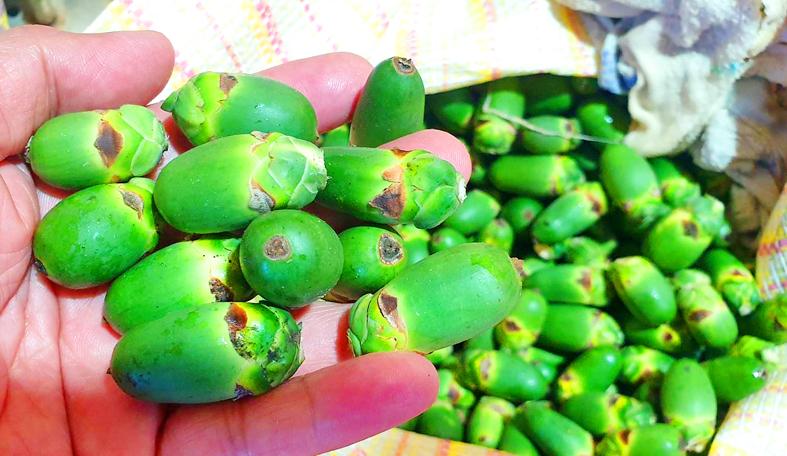Several Taiwanese were detained in Turkey after allegedly taking betel nuts into the country, which regards them as containing illegal drugs, the Ministry of Foreign Affairs said on Friday.
The Chinese Consulate-General in Istanbul on Thursday said in a statement that Chinese and Taiwanese were detained upon arrival in Turkey for carrying betel nuts.
In Taipei, ministry spokeswoman Joanne Ou (歐江安) confirmed that the Taipei Economic and Cultural Mission in Ankara since March has received several reports of Taiwanese being detained by local authorities for carrying betel nuts.

Photo: Yeh Yung-chien, Taipei Times
The mission has asked Turkish authorities to respect the rights of the suspects, and the authorities offered them attorneys and interpreters, Ou said.
While Taiwan’s diplomatic personnel had applied to visit the detained Taiwanese, Turkey’s detention centers are not open to visitors due to COVID-19 restrictions, she said.
The cases have entered judicial proceedings, and the ministry would continue to monitor developments, she said.
The mission would provide assistance to the suspects and their families, she said.
People who travel to Turkey must not take betel nuts, as they would be infringing on local laws, she added.
While Turkey’s criminal code does not stipulate a specific ban on betel nuts, authorities list products as prohibited articles if they contain arecoline hydrobromide.
Turkish law says that people who manufacture, import or export illegal drugs face prison terms of 20 to 30 years, while those found to have distributed drugs or to be involved in drug transactions face jail terms of more than 10 years.
Additional reporting by CNA

The manufacture of the remaining 28 M1A2T Abrams tanks Taiwan purchased from the US has recently been completed, and they are expected to be delivered within the next one to two months, a source said yesterday. The Ministry of National Defense is arranging cargo ships to transport the tanks to Taiwan as soon as possible, said the source, who is familiar with the matter. The estimated arrival time ranges from late this month to early next month, the source said. The 28 Abrams tanks make up the third and final batch of a total of 108 tanks, valued at about NT$40.5 billion

Two Taiwanese prosecutors were questioned by Chinese security personnel at their hotel during a trip to China’s Henan Province this month, the Mainland Affairs Council (MAC) said yesterday. The officers had personal information on the prosecutors, including “when they were assigned to their posts, their work locations and job titles,” MAC Deputy Minister and spokesman Liang Wen-chieh (梁文傑) said. On top of asking about their agencies and positions, the officers also questioned the prosecutors about the Cross-Strait Joint Crime-Fighting and Judicial Mutual Assistance Agreement, a pact that serves as the framework for Taiwan-China cooperation on combating crime and providing judicial assistance, Liang

A group from the Taiwanese Designers in Australia association yesterday represented Taiwan at the Midsumma Pride March in Melbourne. The march, held in the St. Kilda suburb, is the city’s largest LGBTQIA+ parade and the flagship event of the annual Midsumma Festival. It attracted more than 45,000 spectators who supported the 400 groups and 10,000 marchers that participated this year, the association said. Taiwanese Designers said they organized a team to march for Taiwan this year, joining politicians, government agencies, professionals and community organizations in showing support for LGBTQIA+ people and diverse communities. As the first country in Asia to legalize same-sex

MOTIVES QUESTIONED The PLA considers Xi’s policies toward Taiwan to be driven by personal considerations rather than military assessment, the Epoch Times reports Chinese President Xi Jinping’s (習近平) latest purge of the Chinese People’s Liberation Army (PLA) leadership might have been prompted by the military’s opposition to plans of invading Taiwan, the Epoch Times said. The Chinese military opposes waging war against Taiwan by a large consensus, putting it at odds with Xi’s vision, the Falun Gong-affiliated daily said in a report on Thursday, citing anonymous sources with insight into the PLA’s inner workings. The opposition is not the opinion of a few generals, but a widely shared view among the PLA cadre, the Epoch Times cited them as saying. “Chinese forces know full well that